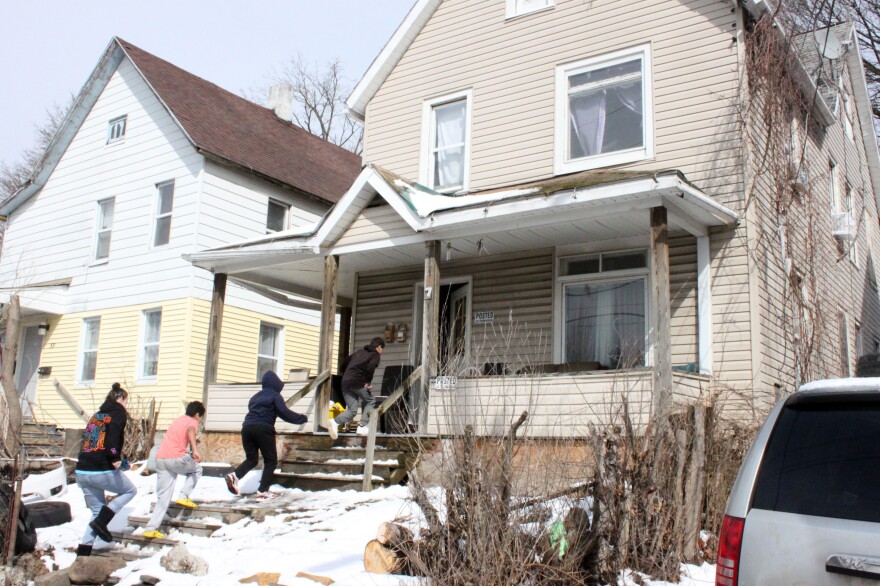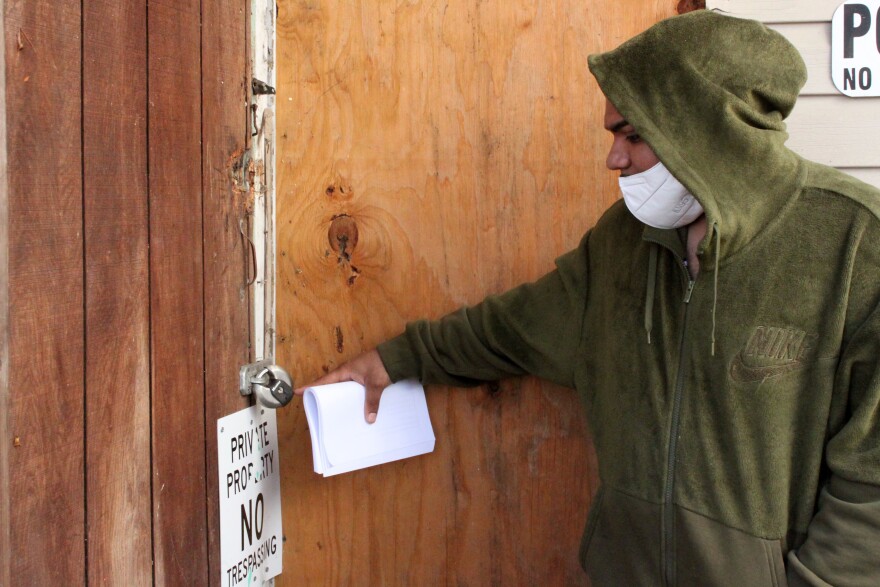The water at the Garcias' Binghamton, N.Y., home was shut off in early February. Despite multiple court orders, their landlord still hasn't turned it back on.
Angel Garcia and his wife, Deidre, now must walk their seven kids, all under 10 years old, down the street to their aunt's house to wash.
"They shouldn't have to walk down the street to bathe," Garcia said. "They should be able to do it in their own comfort, in their house."
The family will still cook at home, but they have to use bottled water.
Their landlord, Douglas Ritter, said the family was intentionally flooding the downstairs neighbor's apartment, making it uninhabitable. The Garcias denied that, and have sued Ritter for damages and rent.
The Broome County Supreme Court ordered Ritter to restore water service twice, after the City of Binghamton's code enforcement office did the same on several occasions and condemned the property. He has not complied.
The water shut-off came months after Ritter tried to get a court order to evict the family for nonpayment of rent last September. The Garcias had been a few months behind on rent over the summer, and after paying that back, fell short again when both parents saw their work hours cut because of COVID surges in the fall.
But since the family applied for New York's Emergency Rental Assistance Program (ERAP), their eviction case was paused indefinitely.
New York's eviction protections are among the most restrictive
Like tenants across the country, tens of thousands of renters in New York are still waiting to get a share of the federal rent relief distributed to states and municipalities last year. While New York's eviction moratorium expired on Jan. 15, tenant protections there remain among the most restrictive in the country. Anyone who both faces eviction for nonpayment and has a pending application for the state's rental assistance program is protected from a court-ordered eviction by law.
A similar measure in California protects tenants who are still waiting to be approved for rental assistance from eviction. Legislators voted to extend that through the end June, though the state will no longer accept new applications for aid.
A more short-term protection exists in Connecticut, where tenants who apply for rental assistance can ask the court for a 30-day pause on their eviction cases. In Seattle, renters with school-aged children cannot be evicted for nonpayment through the end of the school year.
Protections such as these have continued to frustrate some landlords, including Ritter. He said his "right" to a court-ordered eviction is being denied as long as pandemic restrictions remain in place.
"I would like the state to give me back my federal civil rights law and state constitutional guaranteed rights of due process," Ritter said, "by immediate trials and evictions."
Eviction cases have resumed in New York, but the Garcias are among the thousands of tenants still waiting to hear whether they will get rental assistance from the state.
New York exhausted the roughly $2 billion in federal rent relief it received last year. While the state temporarily stopped accepting applications, a court order this January forced the state to reopen the program.
Tenants can still apply for aid, but the agency administering the funds told renters this month that the fund was depleted, and any request entered after Oct. 7, 2021 isn't likely to get fulfilled anytime soon. That includes the Garcias, who applied in January.
Their landlord, Ritter, said he did not turn the family's water service off because their eviction was paused or because they applied for rental assistance. Still, he has no plans to turn on the water until the Garcias are gone.
Ritter said he would not verify their application for rental assistance to get their back rent paid either. A landlord's sign-off is among the requirements to receive aid.
Bill Niebel, an eviction defense attorney with Legal Services of Central New York, represents the Garcias in the water service case, as well as multiple tenants in other properties owned by Ritter.
Niebel said while some landlords have been patient with the slow rental assistance process, Ritter and others have not.
"There are some who just say, 'Nope, I don't want to participate. I want this person out,'" Niebel said. "Mr. Ritter, again, is somewhat extreme in that it seems like he's not participating with any ERAP applications."

Tenants in NY can take legal action, but results vary
While Binghamton's code enforcement office could use its emergency power to turn the water back on, city officials said in this case, the repairs needed to do so are too extensive to fix. Ritter cut part of the pipes from the apartment building where the Garcias live, and padlocked the door to the plumbing to prevent them from being fixed.
"He's effectively evicted them by turning off the water such that they have to leave imminently," Niebel said.
In New York, pressuring or forcing a tenant to leave their home by discontinuing essential services is defined as unlawful eviction, a misdemeanor.
Police arrested and charged Ritter with unlawful eviction for doing so in late February. If convicted, he could be sentenced to up to a year in jail.
But of the 24 landlords arrested on that charge between January 2020 and June 2021, none of them received jail time, according to court data released last year. Only three were convicted and fined.
Marie Claire Tran-Leung of the National Housing Law Project in Washington, D.C., said legal action against landlords often takes a long time. It is part of the reason many families choose to leave their home without reporting the illegal eviction.
Plus, Tran-Leung said, some households would not trust law enforcement to help.
"Particularly families of color, if you have persons with disabilities, marginalized families, people who are undocumented—they're not trying to bring in more law enforcement," Tran-Leung explained.
Because of this, data on out-of-court evictions—which legal aid attorneys often refer to as informal or "self-help" evictions—is limited, but the practice is a top concern among legal aid attorneys nationwide. Of the attorneys surveyed by the National Housing Law Project in July 2020, when the Centers for Disease Control and Prevention's federal moratorium on evictions was in effect, 91% reported cases of illegal eviction in their area.
A follow-up survey saw 35% of legal aid attorneys report an increase in illegal evictions or lockouts since the moratorium was lifted in August 2021, in addition to a rise in court-sanctioned evictions.
Researchers have begun to examine the effect of the moratorium on self-help evictions locally, too. In a survey of renters conducted with the state's tenants union, researchers at the University of Washington found the number of low-income tenants experiencing informal evictions of any kind increased from 13.7% before the pandemic, to 19.4% during it.
Landlords, according to tenants surveyed, told tenants to leave over text, changed locks and shut off utilities, like in the Garcias' experience. Researchers did not, however, evaluate how often these tactics came after landlords tried to evict the tenant in court.
Back in Binghamton, the Garcias are looking for a place to move, but affordable options in the area are scarce.
"Everything's for college students, or everything is $1,500 and above with no utilities included," Garcia said. "I can't afford that."
If they're forced to move out, the family may split up and stay with relatives. Garcia said he wants to avoid that if he can.
Copyright 2022 WSKG Radio

